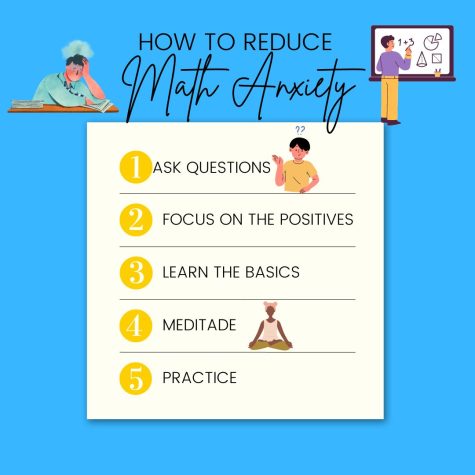Math anxiety is a real chronic disorder where people feel long-lasting anxiety and worry about math situations like tests, math homework or general situations where you will need to use math.
According to the Los Angeles Times, “Around 93% of U.S. adults indicate that they suffer from some level of negative emotions — and sometimes physical symptoms such as clammy hands — when asked to interact with mathematical problems.”
Math anxiety develops when there is a negative experience from learning math in school or at home; factors that contribute to math anxiety can be parents, peers and teachers.
When parents are helping their children with math homework, there is typically an increased amount of stress whether the parents are good with math or not.
Parents get frustrated with their children when helping them and this can cause stress to the child when trying to learn.
Math anxiety usually starts early and it only gets worse as the person grows older.
According to Medical News Today, “Untreated anxiety can lead to other problems, such as depression, substance use disorders, and social isolation.”
It can also cause the person to develop Dyscalculia, a learning disability that causes difficulty understanding numbers and are more likely to develop math anxiety.
Math anxiety has become a huge problem for college students and it has even caused some to drop out.
In the first year of college, students need to take general education classes and one of those classes is a math class.
According to The Washington Post, “Although 60 percent of students enrolled at community colleges must take at least one course in math, about eighty percent of students never fulfill the requirement. They leave without graduating.”
A lot of times, math class is the only thing stopping students from graduating and they end up dropping out because they can’t pass the class.
Some symptoms of math anxiety are difficulty remembering math facts, lack of motivation to work on math, reliance on memorization rather than understanding and fear of being tested on one’s math ability.
A way to reduce math anxiety is by asking questions, as simple as that is.
Many times people are afraid to ask for help but math isn’t easy for someone to learn by themselves.
Another way to reduce math anxiety is by learning the basics, even though the basics can also be difficult to learn, it is a way that will help people get started on the problem and feel more at ease.
Students should also focus on mindfulness as meditation is a great way to calm their nerves when it comes to math.

Students should relax, clear their minds or even listen to soft music before starting on math work.
Meditation will help individuals focus and help them have better concentration.
Practice makes perfect, when doing any sort of task you need to practice to familiarize yourself with the task, and It is no different when it comes to math.
Schools need to speak more about math anxiety and give students more resources so they feel comfortable learning math so they can continue their educational goals.










